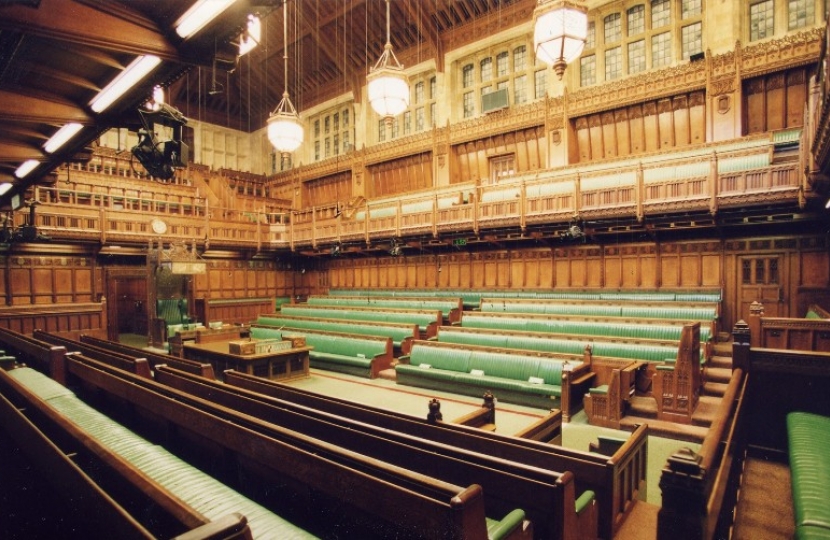
Members of Parliament are elected to the House of Commons to represent the interests and concerns of all the people who live in their constituency, whether they voted for them at the General Election or not. They are only able to deal with issues raised by people who live in their constituency, called constituents.
MPs consider and vote on legislation and use their position to ask government ministers questions about current issues.
They split their time between working in Parliament and working in the constituency. In Parliament, MPs spend their time fighting for the interests of their constituents, attending debates, scrutinising and voting on legislation, and attending meetings. In the constituency, MPs hold advice surgeries for their constituents to come and talk to them about local issues and problems, attend meetings and community events, as well as visiting local organisations and businesses.
Members of Parliament are able to help with all matters for which Parliament or central government is responsible.
Contacting government departments
When a constituent writes to their MP, they will write to the relevant department or official or the Minister involved. Many problems are solved in this way.
Alternatively, if a constituent is happy for the issue to be made public, an MP can ask an oral or written question, secure a debate or petition Parliament.
List of Government departments:
Department for Business & Trade https://www.gov.uk/government/organisations/department-for-business-and…
Responsible for Government policy on business, trade, enterprise, universities, further education and science.
Department for Culture, Media and Sport https://www.gov.uk/government/organisations/department-for-culture-medi…
Responsible for Government policy on culture, the arts, media, gambling, the national lottery, sport and the Olympics.
Department for Education https://www.gov.uk/government/organisations/department-for-education
Responsible for Government policy on schools in England, children, young people, families, education and training for 16 to 19 year olds, school standards and teacher training.
Department for Energy Security & Net Zero https://www.gov.uk/government/organisations/department-for-energy-secur…
Responsible for Government policy on energy and climate change.
Department for Environment, Food and Rural Affairs https://www.gov.uk/government/organisations/department-for-environment-…
Responsible for Government policy on the natural environment, food, farming, fisheries, animal health and welfare, rural communities and environmental protection.
Department of Health & Social Care https://www.gov.uk/government/organisations/department-of-health-and-so…
Responsible for Government policy on Health and provides strategic leadership for public health, the NHS and social care in England.
Department for Levelling Up, Housing & Communities https://www.gov.uk/government/organisations/department-for-levelling-up…
Responsible for investing in local areas to drive growth and create jobs, delivering the homes our country needs, supporting our community and faith groups, and overseeing local government, planning and building safety.
Department for Science, Innovation & Technology https://www.gov.uk/government/organisations/department-for-science-inno…
Responsible for helping to encourage, develop and manage the UK's scientific, research, and technological outputs, and for managing the necessary physical and digital infrastructure and regulation to support the British economy & UK public services
Department for Transport https://www.gov.uk/government/organisations/department-for-transport
Responsible for Government policy on aviation, roads, rail and shipping
Department for Work and Pensions https://www.gov.uk/government/organisations/department-for-work-pensions
Responsible for Government policy on welfare and pension policy, including pensions, the child support agency and job centres.
Foreign, Commonwealth & Development Office https://www.gov.uk/government/organisations/foreign-commonwealth-develo…
Responsible for Government policy on foreign affairs and diplomacy. The Foreign Office is also responsible for Consular services, travel advice and sanctions implemented by the UK.
HM Treasury https://www.gov.uk/government/organisations/hm-treasury
Responsible for Government policy on economics, finance and taxation
Home Office https://www.gov.uk/government/organisations/home-office
Responsible for Government policy on crime, the police, counter terrorism, alcohol, drugs, immigration and passports.
Ministry of Defence https://www.gov.uk/government/organisations/ministry-of-defence
Responsible for Government policy on all defence issues.
Ministry of Justice https://www.gov.uk/government/organisations/ministry-of-justice
Responsible for Government policy on the Courts, the Probation Service and Prisons.
Scotland Office https://www.gov.uk/government/organisations/office-of-the-secretary-of-…
Responsible for ensuring Scottish interests are fully and effectively represented at the heart of the UK government, and the UK government’s responsibilities are fully and effectively represented in Scotland.
Wales Office https://www.gov.uk/government/organisations/office-of-the-secretary-of-…
Responsible for ensuring Welsh interests are represented at the heart of the UK government and the UK government’s responsibilities are represented in Wales.
Oral or written questions
Once a month each minister from each government department answer questions from MPs at the Dispatch Box. There is a limit to the number of questions that can be asked. MPs can also table a written question to the relevant Government department, which are published in Hansard. http://www.parliament.uk/business/publications/hansard/
Adjournment Debate
MPs may be able to raise a constituent's issue in a half-hour Adjournment Debate. To get an adjournment debate, MPs must be successful in a ballot of Members of Parliament or have the subject chosen by the Speaker. The debates are usually the last business of the day and a government minister responds at the end of the debate.
Petition
Members of Parliament can present a petition to Parliament on behalf of their constituents. The format and wording of the petition need to be in a particular way. For more information or guidance, please contact -
Clerk of Public Petitions Journal Office House of Commons London SW1A 0AA
More information is also available here: https://petition.parliament.uk/
MPs do not have any jurisdiction over local Council decisions. However, they can write to a local Council and ask them to look into a problem or to reconsider an issue. In the first instance, constituents should contact their local Council or Councillor.


